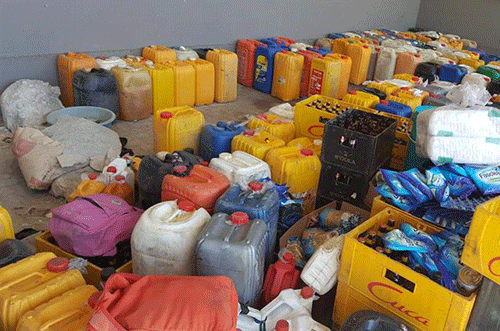Individuals selling fuel from unregistered outlets or without the necessary licensing and documentation have been implored to end their illegal activities immediately. This is a message from the acting executive director (ED) in the mines and energy ministry, Bryan Eiseb, who noted that a persistent trend of rising fuel prices is driving struggling consumers to alternative and illegal fuel sources.
“The ministry has observed with concern the proliferation of advertisements on social media platforms wherein individuals or entities are offering to sell wholesale fuel licences, retail fuel licences, and are marketing fuel at prices not officially gazetted, often from locations lacking the necessary licensing,” Eiseb stated yesterday.
Via a ministerial statement dated 13 November 2023, the ED explained that drivers have started swarming to unlicensed fuel vendors to fill up their tanks due to an ongoing three-year trend of rising fuel prices.
These alternative, illegal and less expensive refills are preferable to the increasingly exorbitant pump prices. As of this month, Namibian motorists are paying N$22.88 for petrol, N$23.15 for diesel 50 ppm, and N$23.35 for diesel 10 ppm.
In comparison to the last year’s fuel tariffs, local prices have increased N$0.35 per litre on petrol and N$1.40 on diesel between March 2018 and March 2019. Between 2019 and 2020, the petrol price increased by N$1.00 and by N$0.20 on diesel.
During the last 12 months, as global and domestic economies continue struggling to recover from the devastating impact of the pandemic, constrained supply lines and overwhelming inflation, both petrol and diesel prices have increased by about 51% and 60%, respectively.
This has led unscrupulous individuals to try and benefit in the same way international oil companies are raking in massive profits.
The mines and energy ED further stated the pricing of fuel, encompassing petrol and diesel, is subject to regulatory control and that these prices are regularly updated and officially published.
“Fuel wholesale licences, fuel retail licences and fuel installation certificates are non-transferable and therefore cannot be offered for sale,” Eiseb emphasised.
Fuel retail licences permit the operation of a fuel retail outlet, fuel wholesale licences authorise business operations as a fuel wholesaler, while a fuel consumer installation certificate is required for commercial or industrial enterprises, legitimate farming activities, or mining operations. All these mentioned licences and certificates can only be issued by the mines and energy ministry.
Thus far, numerous illegal fuel dealers have been convicted and imprisoned over the years as a result of the illicit and dangerous practice. However, the advantages of turning a profit appear to outweigh the danger of destitution as more traders are becoming increasingly visible in and around Oshikango.


